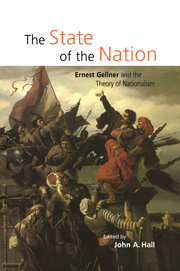Book contents
- Frontmatter
- Contents
- List of contributors
- Introduction
- Part I The making of the theory
- Part II The classical criticisms
- 3 Real and constructed: the nature of the nation
- 4 The curse of rurality: limits of modernisation theory
- 5 Nationalism and language: a post-Soviet perspective
- 6 Ernest Gellner's theory of nationalism: some definitional and methodological issues
- Part III Bringing politics back in
- Part IV Wider implications
- Bibliography of Ernest Gellner's writings on nationalism
- Index
4 - The curse of rurality: limits of modernisation theory
Published online by Cambridge University Press: 05 December 2011
- Frontmatter
- Contents
- List of contributors
- Introduction
- Part I The making of the theory
- Part II The classical criticisms
- 3 Real and constructed: the nature of the nation
- 4 The curse of rurality: limits of modernisation theory
- 5 Nationalism and language: a post-Soviet perspective
- 6 Ernest Gellner's theory of nationalism: some definitional and methodological issues
- Part III Bringing politics back in
- Part IV Wider implications
- Bibliography of Ernest Gellner's writings on nationalism
- Index
Summary
Northern Ireland, the Basque Country, Corsica, Bosnia-Herzegovina, Ngorno-Karabakh: this list of familiar trouble spots is neither complete nor extended beyond Europe, in which case it would be at least eight times longer. Originally coined for Ireland, ‘troubles’ in this sense have multiplied and become global, notably since 1989. No serious newspaper and few TV bulletins are without their quota of violent trouble items, which often enough make up most of the news.
Under such a barrage it is easy to feel ‘trouble’ as a climate of the age, and link it to one indiscriminate ‘-ism’ or another. Yet even from the restricted sample quoted something else may spring to the eye, not so easily classified. Most such ethnonationalist conflicts seem to go on recurring in predominantly rural situations. Nor are these ‘rural’ merely in the sense of being agricultural or non-urban – like East Anglia, say, or the Beauce plain in central France. No, they are areas where ‘rural’ tends to mean ‘peasant’ – that is, where an historical pattern of small landholding prevails, or has until recently prevailed, marked by intense heritable rights, rigid morality or faith, customary exclusivity and an accompanying small-town or village culture.
It is certainly also true that the troubles are not literally confined to the countryside. Thus, Sarajevo was a key site for a good deal of what was none the less more accurately described as the Bosnian ‘village war’.
- Type
- Chapter
- Information
- The State of the NationErnest Gellner and the Theory of Nationalism, pp. 107 - 134Publisher: Cambridge University PressPrint publication year: 1998
- 9
- Cited by



